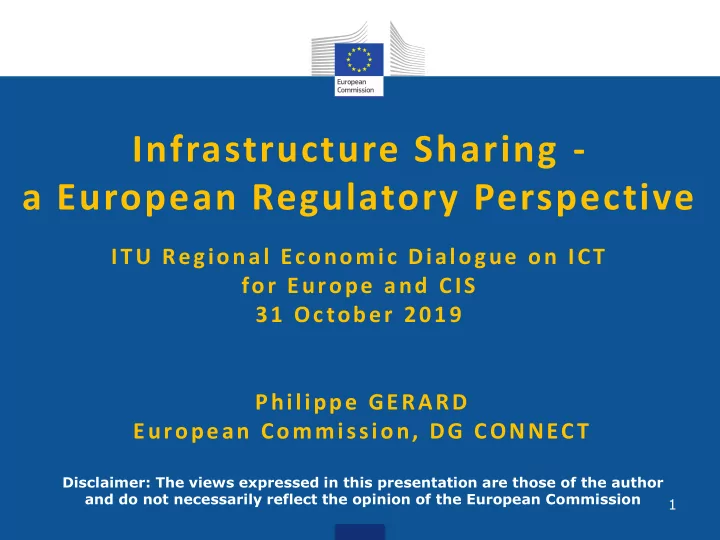

Infrastructure Sharing - a European Regulatory Perspective ITU Regional Economic Dialogue on ICT for Europe and CIS 31 October 2019 Philippe GERARD European Commission, DG CONNECT Disclaimer: The views expressed in this presentation are those of the author and do not necessarily reflect the opinion of the European Commission 1
EU Regulatory approach to infrastructure sharing Infrastructure sharing can be instrumental for the deployment of very high capacity networks Reduced cost and risk of deployment -> faster rollout and wider reach, especially in less densely populated areas Reduced environmental impact Efficient use of spectrum and network assets May arise either as a result of a regulatory obligation or as a voluntary agreement 2
The Code Access Regulation Infrastructure sharing as a regulatory obligation Pursuing public interest objectives and/or addressing specific market failures Under the Broadband Cost Reduction Directive : • All network operators (telecoms, electricity, gas, water etc.) are obliged to meet reasonable requests for access to their physical infrastructure it for deploying high- speed broadband (Art. 3) Under the European Electronic Communications Code: To pursue objectives of public interest (environment, health, town planning) (Art. 44): • For infrastructure that has been built on rights of way , authorities may impose sharing or co-location of network elements To address market failures related to Significant Market Power (Art. 68): • Operators designated with SMP may be obliged to provide access to their infrastructure. Obligations may concern physical, passive or active elements. To enable the deployment of new networks, focus is on physical infrastructure . To address insurmountable obstacles to market driven deployment for mobile (Art. 61): • Competent authorities are able to impose mobile infrastructure sharing or localised 3 access agreements
The Code Access Regulation Voluntary infrastructure sharing Incentivising co-investment in fixed networks and promoting efficiencies in mobile networks Incentivising co-investments in fixed very high capacity networks by deregulating under strict conditions: • SMP operators commit on open offers for co-investment with other operators: • On fair, reasonable and non-discriminatory terms to co-investors , allowing effective and sustainable competition • Allowing access to non co-investors , initially to legacy capacity and over time to more advanced capabilities of the network • Process managed by the NRAs, assessing the commitments (also by means of a market test ) and making them binding if they decide to deregulate Promoting mobile infrastructure sharing: • When attaching conditions to the rights of use for radio spectrum, competent authorities may expressly authorise sharing of passive or active infrastructure 4 • Restricting spectrum sharing is not allowed
The Code Spectrum Management Ex-post competition law Mainly Article 101 TFEU (agreements that restrict competition) Compliance with ex-ante regulatory framework does not exempt network sharing co-operations from ex-post competition law • Potentially relevant factors for the assessment (but always case-by-case): • number and market position of operators involved • technical form of the cooperation (active/passive/spectrum) • legal form of the cooperation (e.g. JV) • geographical scope (countrywide/rural etc.) • exchange of commercially sensitive information • Ongoing investigation by European Commission in the Czech Republic • Statement of objections adopted on 9 August 2019 • Competition concerns mainly relate to a possible reduction of incentives to invest and improve the shared network 5 • Adoption of SO does not prejudge the outcome
Conclusions • Network sharing can lower costs and risks for operators and bring significant benefits in terms of rollout speed, network coverage and service quality • In the European regulatory framework, obligations to share infrastructure can be imposed only under strict conditions , in order to address specific market failures or public interest objectives • Voluntary sharing agreements , both in fixed and mobile networks are promoted and incentivised , while providing for appropriate pro-competitive safeguards • All agreements continue to be subject to ex-post competition law – but there is significant scope for pro-competitive sharing 6
The Code Thank you for your attention 7
Recommend
More recommend